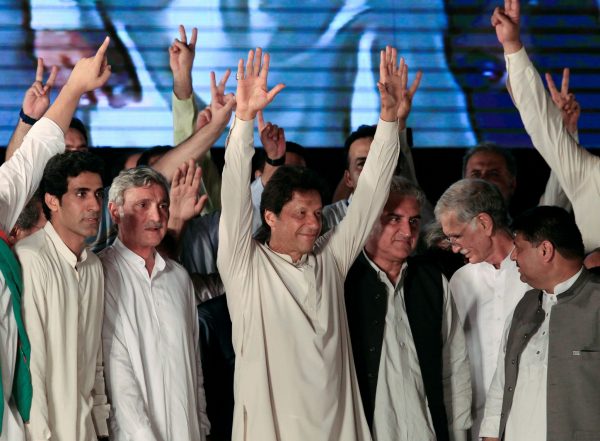Dithering over choosing a successor, the then ruling Pakistan Muslim League (Nawaz) (PML-N) settled for the relatively inconsequential Shahid Khaqan Abbassi. Abbassi ran a surrogate government while Nawaz and his daughter campaigned (more in opposition to their own party’s administration) against the judiciary and the army.
Electoral troubles began early in the year for the PML-N when the party lost its majority in the province of Baluchistan following a motion of no-confidence against the provincial chief minister and an intra-party revolt that led to the motion’s unsuccessful defeat. The party was battered further in March when the opposition candidate for Senate chairman, a political novice from Baluchistan, beat his PML-N rival despite the ruling party’s numbers in the Senate. All this while then leader of the opposition, Imran Khan, continued his relentless campaign against governmental corruption.
The elections produced a Khan-led Pakistan Tehreek-e-Insaaf (PTI) majority in the National Assembly, which formed a governing coalition at the federal level and in the all-important Punjab province. The PTI also governs Khyber Pakhtunkhwa province, where it returned to power with a two-thirds majority. The election broke the grip on power that had oscillated between the Pakistan Peoples’ Party (PPP) and the PML-N for two decades.
Prime Minister Khan seems to have established a comfortable working relationship with the army. If this relationship can be nurtured, it may solve one of Pakistan’s perennial power equilibrium problems. Sharif sought to make the army subservient to his imperial style, while PPP governments outsourced security to the army.
But beyond civil–military relations, Pakistan continues to suffer from a lack of good governance. Politicians and members of the bureaucracy alike have long been complicit in corruption for personal profit. The accountability vacuum is now being filled by suo motu actions of the Supreme Court, which have moved the administration in some landmark cases. While this activism is winning kudos from the public, the rulings are a bane for the government.
Contesting elections against corruption and the unbridled use of power, the PTI inherited the worst economic indicators in Pakistan’s history. The PML-N’s profligate financial model has left the country’s economy in tatters. With external debt reaching nearly US$100 billion, falling exports and shrinking investments, the Pakistan rupee lost over 30 per cent of its value in 2018. This depreciation is in turn raising anxiety levels in the business community and adding to inflationary pressures.
Faced with massive debt, the PTI government initially tried to obtain bridging finance from Saudi Arabia, the United Arab Emirates and China to postpone an inevitable request for assistance from the International Monetary Fund (IMF). Though the government secured commitments that fell short of what it had hoped for, the agreements have allowed breathing room for Islamabad to resist some of the harsh conditions that the IMF seeks to impose.
The PTI government has also shown some gumption in reforming Pakistan’s tax structure and broadening the tax base. Pakistan has only 1 million taxpayers in a population of over 200 million. To make up for the shortfall in tax revenue, governments have typically resorted to indirect taxation that hits the common man.
In the realm of foreign policy, Pakistan’s first diplomatic outreach after the PTI government took power was to Kabul. Khan’s well-known stance on building trust between Pakistan and Afghanistan has led to a decline in the cross-border blame game. Pakistan needs a peaceful, settled Afghanistan for its own sake.
Relations between Pakistan and the United States, on the other hand, are testy. Khan has been firmer than his predecessors in articulating Pakistan’s position that it is the international community’s responsibility ‘to do more’ in Afghanistan. US President Donald Trump’s letter to Khan in December 2018 formally asking for help in seeking a negotiated settlement is a positive development.
Relations with India remain at a stalemate, with the two countries trading barbs and exchanging fire over Kashmir’s Line of Control throughout the year. Islamabad’s decision to allow Sikhs visa-free entry to visit one of their holiest shrines four kilometres into Pakistan was the only positive development in an otherwise tense relationship.
China remains the lynchpin of Pakistan’s security and economic stability. Apart from trips to Gulf states, China was Prime Minister Khan’s first overseas visit. The two countries reaffirmed their commitment to the multi-billion dollar China–Pakistan Economic Corridor project.
The PTI government came to power buoyed by expectations. While its performance so far has been marked by inaction, incoherence and even a lack of control in some cases, Khan’s personal integrity is helping to ease public impatience. To sustain that goodwill, he will need to turn his focus to everyday issues that affect the lives of common citizens.
Sajjad Ashraf served as an adjunct professor at the Lee Kuan Yew School of Public Policy, National University of Singapore from 2009 to 2017. He was a member of the Pakistan Foreign Service from 1973 to 2008.
This article is part of an EAF special feature series on 2018 in review and the year ahead.

